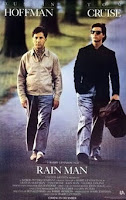The entertainment industry has a tremendous power in shaping the public view of mental health topics. With Silver Linings Playbook, a romantic comedy featuring a protagonist with bipolar disorder, up for eight awards at tonight's Academy Awards, attention is currently being focused on the challenges faced by those affected by mental health conditions.
It is the first movie nominated for all of the "Big Five" awards (Best Picture, Best Director, Best Screenplay, Best Actor and Best Actress) and all four acting awards (add Supporting Actor and Actress). While it is highly unlikely that it will receive all of the awards, Jennifer Lawrence is considered a frontrunner for Best Actress for her portrayal of a young widow facing a her own set of complications following the traumatic death of her husband. After seeing how the film fares tonight, I intend to write a commentary on it in the coming days. It has a lot of interesting implications.
Looking back, however, mental health conditions have definitely had their place in creating award-winning movies. Starting with the early days of the Oscars, here are fifteen films that emphasize a variety of aspects mental health and illness.
All Quiet on the Western Front (1929/30)
Showing World War I from the perspective of the Germans, this film deals with the expectations and realities of war, including the psychological aspects. Well before PTSD was officially defined, elements of it can be gleaned from previous wars, as demonstrated in this production.
Gone with the Wind (1939)
In this epic, the effects of personality disorders on oneself and others can clearly be seen. Critics have noted that heroine Scarlett O'Hara displays characteristics of narcissistic, histrionic, anti-social and borderline personality disorders. In other words, she's the epitome of the
cluster B subsection. In addition, leading lady Vivien Leigh, who played O'Hara, struggled with bipolar disorder.

Rebecca (1940)
Hichcock's psychological dramatic noir thriller (thank you, Wikipedia) features characters who certainly have some significant problems. Based on the novel by Daphne du Maurier by the same name, it also handles themes such as grief, manipulation and suicide.
With its plot centering on a writer's struggle with alcoholism, The Lost Weekend is, according to the Library of Congress, "a landmark social-problem film" with "an uncompromising look at the devastating effects of alcoholism." While the premise might seem like a cliché nowadays, it received significant opposition when it was being produced.
The Best Years of Our Lives (1946)
In the wake of World War II, a new group of veterans had to learn to adjust to civilian life. This movie follows three of them as they struggle to find normalcy. One of them, Homer, lost both hands in the war (which actually hard happened to the actor, Harold Russell). His struggle to deal with a physical handicap that he believes makes him unfit for his fiancée is metaphoric for a lot of the psychological aspects of living through a prolonged trauma like combat. Part of this film's strength is in how it shows the role of social support, both between fellow veterans and those around them.
 One Flew over the Cuckoo's Nest
One Flew over the Cuckoo's Nest (1975)
Because the film takes place in a mental institution, there is a lot of psychological material to draw from. The characters struggle with different conditions, but they also develop a community. The tyrannical Nurse Ratched is a legendary villain and under her reign, the viewer is exposed to a lot of the treatments that have historically (and presently) been used to treat mental illnesses. It's also one of only three movies to win all of the "Big Five" Academy Awards.

Annie Hall (1977)
Considered one of Woody Allen's greatest and most influential films, Annie Hall follows the anxious and neurotic Alvy Singer as he tries to find out why his relationship with the title character failed. This film is worth noting because while Alvy has what appears to be a clear case of generalized anxiety disorder, he has actually lived a relatively normal life. This helps show that mental illness is not just reserved for those with traumatic histories or psychotic symptoms.
Ordinary People (1980)
An upper-middle class family struggles with the accidental loss of one son and attempted suicide of another. It tackles family dynamics in a stressful environment where each individual handles grief in his own way. Since one person with mental health issues will impact the entire family, this film is important in its portrayal of the struggle for normalcy without clear direction.

Amadeus (1984)
While Amadeus is not very historically accurate, it does tackle the interesting issue of delusional obsession. As contemporary composers, Antonio Salieri cannot overcome his jealousy of Mozart's talent. The film shows how Salieri creates a worldview in which he feels justified in using a vengeful plot to gain some sort of "victory" over both Mozart and God Himself. Obsession is usually portrayed in a romantic context, making this film all the more fascinating.

Rain Man (1988)
After his father's death, the narcissistic Charlie finds out that he has a brother, Raymond, who is more or less inheriting everything from their father. An autistic savant, Raymond lives in a mental institution. The question of why Charlie was not told about his brother points directly at the issue of stigma against mental illness, even within families.
The Silence of the Lambs (1991)
The only horror film to ever win an Oscar for Best Picture, The Silence of the Lambs is the most recent winner of the "Big Five" awards. It features Hannibal Lecter, who is both a psychiatrist and a cannibalistic serial killer. The epitome of genius and (criminal) insanity combined, this character has been deemed the greatest villain in movie history by the American Film Institute.
Forrest Gump (1994)
In this beloved movie, Tom Hanks plays Forrest Gump, a man with an intellectual developmental disability. The film displays a very positive attitude towards Forrest, giving him his own talents and showing how he contributed to a variety of historically significant events. It tackles both the challenges and joys experienced by the title character, offering a glimpse into how society treats those who are intellectually challenged.

A Beautiful Mind (2001)
Based on the Nobel-prize winning mathematician John Nash, this film tackles the role of schizophrenia in the protagonist's life. It follows the onset of the illness, which commonly manifests in early adulthood, its identification and how it affects Nash personally and professionally. It acknowledges the permanent nature of the condition, showing that he could achieve success while still experiencing symptoms.

The Hurt Locker (2009)
The effects of war are tackled again, this time with the Iraq War. The film, which made Kathryn Bigelow the first female to win Best Director, covers the acute stress experienced in a war zone and how it affects decision making. Instead of having the focus on the posttraumatic symptoms likely experience by the characters after the story's end, the movie gives insight into its development. This is a valuable perspective, considering the current public discussion surrounding PTSD.
Not all mental illnesses are defined by mood or disconnect with reality. Stuttering is categorized as a mental health condition and can be comorbid with other disorders. In telling the story of King George VI, The King's Speech shows that not even royalty is immune to these challenges. With the help of a speech therapist, George admirably demonstrates the effort that goes into recovery.
Who do you think will win best picture this year? What awards do you think the cast and crew of Silver Linings Playbook might take home tonight?
 Background: Jane is a first-year student from a rural area. She is overwhelmed with living in a larger city, learning about everything on campus, making friends, and keeping up with her studies. She is not yet fully depressed but has bouts of crying, anxiety and stress.
Background: Jane is a first-year student from a rural area. She is overwhelmed with living in a larger city, learning about everything on campus, making friends, and keeping up with her studies. She is not yet fully depressed but has bouts of crying, anxiety and stress. _poster.jpg)





















